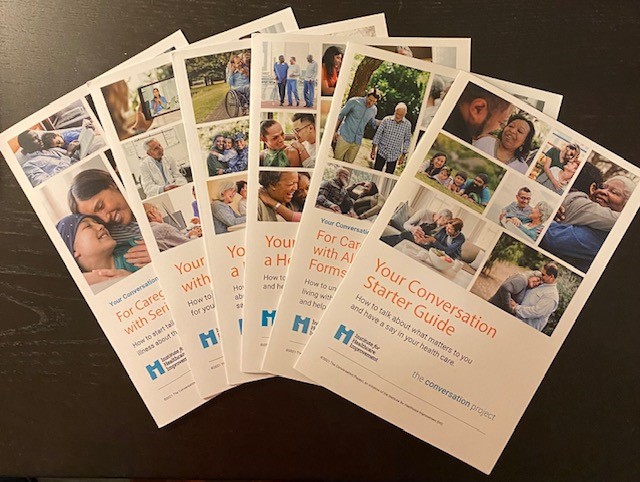Community leaders/groups often wonder what the best tools are for starting advance care planning conversations. Which one of the many available should be encouraged? We feel that when it comes to resources to help initiate conversations, variety is better. We’ve found over the years that some individuals like workbooks or fillable guides (e.g. Conversation Starter Guide), some like games (like those here), others prefer discussion prompts over a meal (e.g. Death over Dinner), or deeper one-on-one facilitated support (e.g. Respecting Choices©). Yet other approaches (e.g. Five Wishes or Prepare for Your Care) resonate in different ways to different people. Our theory is that these diverse sets of resources can complement each other, offering individuals different methods based on what feels right to them. And that’s what we and many of our colleagues in this space are all about: reaching people where they are in ways that matter to them.
To test our theory, leaders from The Conversation Project and Respecting Choices© joined forces to listen and learn about ways individuals were using both our resources. Through a survey sent to over 150 Faculty and Instructors supporting advance care planning teams, we set out to discover if those who were ACP Facilitator certified and using Respecting Choices© were also using resources from The Conversation Project, how they used both and if they had any suggestions on improving the alignment of our resources, messaging and/or collective work.
Of the approximately 55% who responded, over 60% noted they were using both resources already, and an overwhelming majority noted the complimentary nature of the resources for various types of audiences. The Conversation Starter Guide and opening phrases included not only in the guides but also in several videos (like the Practice Makes Perfect and Proxy videos) and blogs serve to help open up the conversation and start individuals thinking about what matters to them. The guides offer a space to get your thoughts written down. The Respecting Choices© resources and one-on-one facilitated ACP conversations then serve to help individuals go deeper into discussion with guided exploration of their goals and values as they might impact future and current healthcare decisions.
No one responding to the survey noted any conflicting messages or duplication. Rather, they highlighted how these tools fit, complimenting each other and offering a variety of ways to help individuals in their journey toward sharing their wishes for care. And that’s what matters to us.
What resources are you using to help those in your community or in your personal circles to jump start conversations? And how are you using them? Or maybe there is a gap that we can explore? Share your ideas in the comment box below and/or email Respecting Choices or The Conversation Project directly.
Patty Webster, MPH, is an Improvement Advisor for The Conversation Project, an initiative of the Institute for Healthcare Improvement. Pat Tadel, MSN, RN, is a Senior Faculty Consultant for Respecting Choices©.
Want to keep connected to The Conversation Project? Sign-up for our newsletter(s), follow us on social media (Twitter, Facebook), download our conversation starter resources and feel free to reach us at ConversationProject@ihi.org.


I use both Respecting Choices (certified) and Conversation Project resources. I also use what many at my classes what I received from Rosemary Lloyd, (the past spiritual care provider to The Conversation Project) a letter to my loved ones, I used it for my own advance care documents and conversations and converted it into a template for classes. I’d love to share it and will try to forward.
This collaboration beautifully highlights the power of variety in advance care planning. No single approach fits all—each person connects differently.